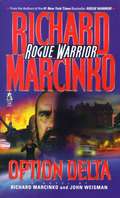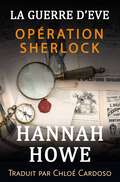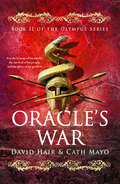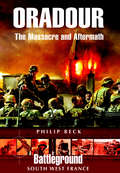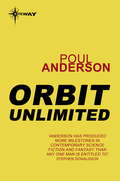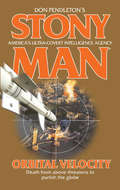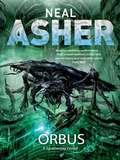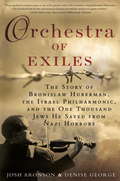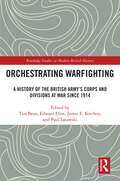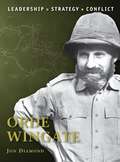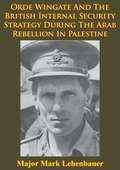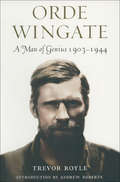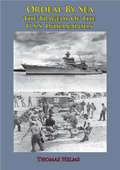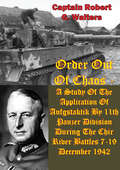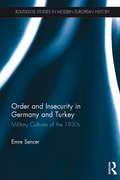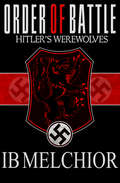- Table View
- List View
Optimism, and Strike Against War
by Helen KellerAn essay on optimism by the famous author, activist, and lecturer, as well as a speech called Strike Against War that she gave at Carnegie Hall in New York City on January 5, 1916 in opposition to World War I.
Optimizing U.S. Air Force and Department of Defense Review of Air Force Acquisition Programs
by National Research Council of the National AcademiesThe Department of Defense (DOD) spends over $300 billion each year to develop, produce, field and sustain weapons systems (the U.S. Air Force over $100 billion per year). DOD and Air Force acquisitions programs often experience large cost overruns and schedule delays leading to a loss in confidence in the defense acquisition system and the people who work in it. Part of the DOD and Air Force response to these problems has been to increase the number of program and technical reviews that acquisition programs must undergo. This book looks specifically at the reviews that U.S. Air Force acquisition programs are required to undergo and poses a key question: Can changes in the number, content, or sequence of reviews help Air Force program managers more successfully execute their programs? This book concludes that, unless they do it better than they are now, Air Force and DOD attempts to address poor acquisition program performance with additional reviews will fail. This book makes five recommendations that together form a gold standard for conduct of reviews and if implemented and rigorously managed by Air Force and DOD acquisition executives can increase review effectiveness and efficiency. The bottom line is to help program managers successfully execute their programs.
Optimizing the U.S. Ground-Based Optical and Infrared Astronomy System
by Committee on a Strategy to Optimize the U.S. Optical Infrared System in the Era of the Large Synoptic Survey TelescopeNew astronomical facilities, such as the under-construction Large Synoptic Survey Telescope and planned 30-meter-class telescopes, and new instrumentation on existing optical and infrared (OIR) telescopes, hold the promise of groundbreaking research and discovery. How can we extract the best science from these and other astronomical facilities in an era of potentially flat federal budgets for both the facilities and the research grants? "Optimizing the U. S. Ground-Based Optical and Infrared Astronomy System" provides guidance for these new programs that align with the scientific priorities and the conclusions and recommendations of two National Research Council (NRC) decadal surveys, "New Worlds, New Horizons for Astronomy and Astrophysics" and "Vision and Voyages for Planetary Sciences in the Decade 2013-2022," as well as other NRC reports. This report describes a vision for a U. S. OIR System that includes a telescope time exchange designed to enhance science return by broadening access to capabilities for a diverse community, an ongoing planning process to identify and construct next generation capabilities to realize decadal science priorities, and near-term critical coordination, planning, and instrumentation needed to usher in the era of LSST and giant telescopes.
Option Delta (Rogue Warrior #7)
by Richard Marcinko John WeismanIn six spectacular New York Times bestsellers, covert combat master Richard Marcinko has blown the lid off the classified world of SpecWar ops. Now, the commando's credo "kill-or-be-killed" is pushed to the brink in a shattering new conflict.... The Rogue Warrior is invading Germany with a blitzkrieg of bravado. His secret assignment: recover a pair of U.S. ADM's -- Atomic Demolition Munitions -- lost in the Rhine Valley. Yet, what begins as a simple SEAL mission explodes in his face when terrorists visit the cache site. With military tensions igniting all over the world, America's diplomatic priorities are everywhere but eastern Europe -- and the Rogue Warrior must take matters into his own hands. But not even Marcinko is aware that a cabal of ultranational extremists -- led by Lothar Beck, a billionaire defense contractor -- is ready to use Germany's stockpiled cold War nuclear weapons to carve out Europe's first superpower, a true Fourth Reich. Fortunately Marcinko has some firepower of his own, and the manpower to deliver it with maximum prejudice and extreme efficiency. He and his elite SEALs will have to wade through tango cells of skinheads, neo-Nazis, Russian mobsters, and Middle Eastern terrorists before they get the scent of the real powerbrokers. But once they do, it's time to go hunting -- with no bag limit.
Option for the Sword: N.A.
by Pedro MarangoniA anti communist Brazilian fighter involved in the Portuguese wars to save Angola and Mozambique from communist takeover in the 1970's, Rhodesia Special Branch, French and Spanish Foreign Legion,and lots of action.
Options for Meeting the Maintenance Demands of Active Associate Flying Units
by Robert S. Tripp James M. Masters Kristin F. Lynch John G. Drew Charles Robert RollRAND developed a methodology to help understand and explain the differences between U.S. Air National Guard and active component aircraft maintenance productivity. This research focuses on maintenance options for supporting associate units, where the goal of the associate unit is to produce trained pilots in the most efficient manner possible.
Opération Sherlock: La guerre d'Eve : Les héroïnes du SOE (La guerre d'Eve : Les héroïnes du SOE #5)
by Hannah Howe"Arthur est préoccupé par la dernière arme de terreur des nazis", expliqua Guy. "Des fusées ; elles ont le pouvoir de semer la mort, la destruction et le chaos en Grande-Bretagne. Il veut que nous localisions le site de lancement pour que la RAF puisse le bombarder." "Comment allons-nous faire cela ?" demandai-je. "La Résistance à Paris pense avoir repéré le site", répondit Guy. "Arthur souhaite que nous confirmions leurs soupçons." "Pourquoi le réseau local de Sherlock ne s'en charge-t-il pas ?" demanda Mimi. "Récemment," répondit Guy, "la Gestapo a capturé leur opérateur radio. Leur réseau est complètement désorganisé. La confiance est au plus bas." Je jetai un regard à Mimi et remarquai son visage pâle et tendu. En tant qu'opératrice radio, elle vivait sous une pression permanente ; chaque transmission était un instant à haut risque, un instant de potentiel capture. Un voyage à Paris semblait excitant. Pourtant, le regard préoccupé de Mimi me rappela que nous nous engagions dans une mission périlleuse, peut-être même mortelle.
Oracle's War (Olympus Trilogy)
by David HairOdysseus must fight for the honor of his family, the survival of his people, and the glory of his goddess—from the author of Athena&’s Champion. When Prince Odysseus is sent on a quest to recover his family honor, he&’s led to Delos where a mysterious new prophecy has captivated the gods. Caught in a tangled web of intrigue, he discovers that this prophecy is tied to his own destiny and the fate of his patron goddess, Athena. With the future of his people hanging by a thread, Odysseus, the daemon Bria, the hero Diomedes and a small band of loyal Ithacans, must unveil the truth before it&’s too late. But opposing them is Tiresias, the greatest seer of the age, who will do anything to burn his own vision onto the face of history. Caught between the prophecy, the gods and his mortal enemies, Odysseus must start a war: one that may be impossible to win . . . Oracle&’s War, second in the epic Olympus Series, is perfect for fans of David Gemmell and Madeline Miller. Praise for Athena&’s Champion &“If you like magic and mayhem wrapped around ancient historical legends, this cup of nectar has your name on it. Recommended.&” —Historical Novel Society &“A refreshing, modern take of Odysseus&’ story. It has humor and exciting action.&” —Book Rambler
Oradour: The Massacre and Aftermath (Battleground South West France)
by Philip BeckThis WWII pictorial history illustrates a horrifying episode of destruction in Nazi-occupied France. In June of 1944, the Second SS Panzer Division Das Reich was stationed in Southern France until it was called north to help stop the Allied advance. On its way toward Normandy, Das Reich destroyed the French village of Oradour-sur-Glane and massacred its population. The brutal event ranks as one of the most notorious atrocities of the Second World War. While the scars left behind will never fully heal, many believe they should remain as a lesson to future generations. Though a new village was built nearby, President Charles de Gaulle ordered the ruins of Oradour to be preserved as a memorial to the victims. This fully illustrated volume recounts the history and legacy Oradour&’s destruction, complete with photographs of the ruins throughout
Oral History and the Holocaust in Slovakia: Selective and Contradictory Memories (The Holocaust and its Contexts)
by Monika VrzgulováNearly thirty years ago, Monika Vrzgulová took part in the very first oral history research project aimed at Holocaust survivors in Slovakia. That project transformed her professional as well as her personal life. The Holocaust as a scholarly subject and the oral history method have stayed with her to this day. This book summarizes her findings and the experience she has acquired researching Holocaust memory, combining memory studies, oral history, autoethnography, and reflexive writing methods. It presents data from two international research projects which took part in Slovakia too and are available to experts and the public online. The insights gained from this research are contextualised with the social situation in a country that is trying to come to terms with its past after the fall of Communism.
Orbit Unlimited
by Poul AndersonEarth had changed since the days when her proud space fleets spanned the void of Space. Now her people were packed and packaged tight on Earth, their freedoms exchanged for a promise of stability by a multi-armed autocratic government. Then one small band of people led by a fanatic saw there was one last chance for Man to make his place in the Universe. But to take that chance they had to fight, not only the mighty grip of the government, but the terrible, generation-long voyage fraught with risk. And then, the new planet - strange, challenging, alien...
Orbital Velocity
by Don PendletonWith a mandate to combat terror, the ultra-covert action team called Stony Man works outside official channels. Elite field commandos operate with real-time intelligence from master cybernetics experts. Grit and tactical brilliance are Stony Man's best weapons-and America's best chance when terror strikes from the sky to threaten the globe. An American neo-Nazi has declared war on the governments of the world. His group, Fist of Heaven, controls six weapons platforms in deep space and has launched high-shock kinetic missiles at major cities. The deadly spears have struck London, Moscow, Los Angeles and Tokyo. The death toll is staggering. America is losing the battle to save the planet from the hands of a madman. Grim and determined, Stony Man's teams prepare for the worst as they unleash their own brand of righteous retribution against the Fist of Heaven.
Orbus (A Spatterjay Novel)
by Neal AsherThis is a follow-up to The Voyage of the Sable Keech tracing the journey of an Old Captain, Orbus – a sadist in charge of a crew of masochists - to a planetary wasteland called The Graveyard&’ lying between the Polity and the Prador Kingdom. An ancient war drone by the name of Sniper has stowed away aboard his spaceship, and the purpose of the journey is not entirely what the captain expected. Also heading in the same direction is the Prador king and the Prador Vrell. Vrell, having been mutated by the Spatterjay virus into something powerful and dangerous, has seized control of a Prador dreadnought, killing much of its crew, and is intent on heading back to the Prador Third Kingdom to exact vengeance on the King of the Prador, who tried to have him killed. All three ships are heading towards a climatic confrontation to The Graveyard, where underlying truths about the virus are revealed and an ancient menace to civilization reappears…
Orchestra of Exiles
by Denise George Josh AronsonThe compelling biography of the violinist who founded the Palestine Symphony Orchestra and saved hundreds of people from Hitler--as seen in Josh Aronson's documentary Orchestra of Exiles."The true artist does not create art as an end in itself. He creates art for human beings. Humanity is the goal."--Bronislaw HubermanAt fourteen, Bronislaw Huberman played the Brahms Violin Concerto in Vienna-- winning high praise from the composer himself, who was there. Instantly famous, Huberman began touring all over the world and received invitations to play for royalty across Europe. But after witnessing the tragedy of World War I, he committed his phenomenal talent and celebrity to aid humanity.After studying at the Sorbonne in Paris, Huberman joined the ranks of Sigmund Freud and Albert Einstein in calling for peace through the Pan European Movement. But when hope for their noble vision was destroyed by the rise of Nazism, Huberman began a crusade that would become his greatest legacy--the creation, in 1936, of the Palestine Symphony, which twelve years later became the Israel Philharmonic Orchestra.In creating this world-level orchestra, Huberman miraculously arranged for the very best Jewish musicians and their families to emigrate from Nazi-threatened territories. His tireless campaigning for the project--including a marathon fundraising concert tour across America--ultimately saved nearly a thousand Jews from the approaching Holocaust. Inviting the great Arturo Toscanini to conduct the orchestra's first concert, Huberman's clarion call of art over cruelty was heard around the world. His story contains estraordinary adventures, riches and royalty, politicians and broken promises, losses and triumphs. Against near impossible obstacles, Huberman refused to give up on his dream to create a unique and life-saving orchestra of exiles which was one of the great cultural achievements of the 20th century.Includes Photographs
Orchestrating Warfighting: A History of the British Army’s Corps and Divisions at War since 1914 (Routledge Studies in Modern British History)
by Paul Latawski Tim Bean James E. Kitchen Edward FlintOrchestrating Warfighting provides a detailed and wide-ranging examination of the employment of corps and divisions from the First World War through to the early twenty-first century.Division and corps formations have been at the forefront of the British Army’s prosecution of war since 1914. They constituted the major command and organisational elements that underpinned the conduct of large-scale warfighting on land. Divisions and corps were of central importance to the conduct of the First and Second World Wars, the maintenance of a conventional deterrence posture during the Cold War, and were also employed in major confrontations since 1945, including the Korean War and two Gulf Wars. The British Army of the early twenty-first century still retains two divisional formations alongside the British-led Allied Rapid Reaction Corps within NATO.Orchestrating Warfighting examines British, Dominion, and imperial corps and divisions, taking part in the total wars of the first half of the twentieth century and smaller scale conflicts since 1945. It throws new light on questions of command, generalship, and the management of battles and campaigns across a diverse range of theatres. Orchestrating Warfighting is of interest to historians of the British Army, operational military history, and modern war.
Orde Wingate
by Peter Dennis Jon DiamondOrde Wingate rose to fame by creating the Chindits in Burma in 1943. He is an extremely important figure in military history, and deserves just as much attention as Alanbrooke, Montgomery, and Auchinleck. Unlike them, however, he always operated outside the accepted etiquette and the formal chain of command. He was a maverick and misfit, and he held to the belief that the type of mass warfare demonstrated on the Western Front (1914-18) had very little to do with the warfare of the future. He believed that the latter would require an 'indirect approach', in which heavily lumbering armies would be exquisitely vulnerable to small groups of highly motivated, mobile and well-armed guerrillas. This book covers Wingate's experiences in pre-war Palestine, in Ethiopia in 1941 (where he formed an irregular guerrilla unit to harrass the Italian garrisons) and in World War II Burma, where the two Chindit campaigns would be his apotheosis.
Orde Wingate And The British Internal Security Strategy During The Arab Rebellion In Palestine, 1936-1939
by Major Mark D. LehenbauerThe Arab Rebellion and British Counter-rebellion campaign of 1936 to 1939 in Palestine exhibited many features of modern insurgency and counterinsurgency. This thesis traces the British military thought and practice for countering rebellion as influenced by their Small Wars' experiences, and it then presents the rebellion and counter-rebellion campaign as a case study in their military and political contexts. This study focuses on the evolution of the internal security strategy, and it examines the actions of Captain Orde Wingate both within the campaign and in his attempts to influence it at the tactical, operational, and strategic levels. This research is intended to inform military practitioners about the campaign while highlighting the issues that are encountered when they seek to: (1) apply the contemporary wisdom of military thought and practice to a specific operational environment; (2) negotiate the policy constraints on the possible military "solutions" to the security problems incurred by insurgency; (3) influence various facets of the greater campaign when outside the hierarchy of responsibility and authority to do so; and (4) expose some of the issues involved with a counterinsurgent force's utilization of portions of the indigenous population toward converging interests. This study finds that Wingate sought to shape the evolving internal security strategy through both military and political channels, and that he utilized a variety of mechanisms to do so. Despite tactical successes in his validation of proofs of concept through the Special Night Squads, his determined efforts failed to achieve his stated goals at the operational and strategic levels.
Orde Wingate and the British Army, 1922-1944 (Warfare, Society and Culture #2)
by Simon AnglimMajor General Orde Wingate (1903–1944) was the most controversial British military commander of the Second World War, and perhaps of the last hundred years. Anglim's biography fills a significant void in the literature, making extensive use of Wingate's papers to place him firmly in the context of the British army of the time.
Orde Wingate: A Man of Genius, 1903–1944 (Phoenix Giants Ser.)
by Trevor Royle&“A superb biography&” of the controversial British Army officer who lead the 77th Indian Infantry Brigade against the Japanese in Burma during World War II (HistoryOfWar.org). Winston Churchill described Wingate as a man of genius who might well have become a man of destiny. Tragically, he died in a jungle aircraft crash in 1944. Like his famous kinsman Lawrence of Arabia, Wingate was renowned for being an unorthodox soldier, inclined to reject received patterns of military thought. He was a fundamentalist Christian with a biblical certainty in himself and his mission. He is best-remembered as the charismatic and abrasive leader of the Chindits. With the support of Archibald Wavell, he was responsible for a strategy of using independent groups deep behind enemy lines, supported only by air drops. Wingate was responsible for leading the charge of 2,000 Ethiopians and the Sudan Defence Force into Italian-occupied Abyssinia. Remarkably, he defeated a 40,000 strong enemy that was supported by aircraft and artillery, which Wingate did not possess. Despite his achievements, Wingate suffered from illness and depression and in Cairo attempted suicide. He was not universally liked: his romantic Zionism contrasted with the traditional British Arabist notions. He did, however, lead from the front and marched, ate and slept with his men. In this authoritative biography, Royle expertly brings to life a ruthless, complex, arrogant but ultimately admirable general.&“An insightful look at the controversies which have dogged Wingate&’s reputation over the years . . . strongly recommended to anyone interested in irregular warfare and counterinsurgency operations.&” —African Armed Forces Journal
Ordeal By Fire: An Informal History Of The Civil War [Illustrated Edition]
by Fletcher Pratt Merritt CutlerThis one-volume history on the Civil War brings the events, figures, and battles of monumental conflict vividly to life. Absorbing details of military campaigns, battlefield strategies, and personalities revealed in an audacious style that carries readers breathlessly along from the day of Lincoln's inauguration to Lee's surrender at Appomattox Court House. [Source: Goodreads.com]"The present one-volume history of the war is written for the man-in-the-street who, perhaps justifiably, has not the time to follow out the details of controversies as to the exact sequence of events, especially in some of the battles. It is an effort to follow the main currents of fact and emotion during the war; to include practically everything that contributed to the final result and to omit nearly everything else." [From Author's Foreword]Richly illustrated by distinguished artist Merritt Cuttler with over 40 maps and illustrations.
Ordeal By Sea; The Tragedy Of The U.S.S. Indianapolis
by Thomas HelmJuly 30, 1945: The heavy cruiser U.S.S. Indianapolis was sunk by a torpedo. 1,196 men went into the water. When rescue arrived five days later, only 317 remained. What happened during those five terrible days? Full of harrowing personal accounts from survivors, and written by a veteran who served aboard the cruiser before the attack, Ordeal by Sea chronicles the stark human drama and sensational aftermath of one of the worst disasters in naval history. The story of the doomed mission was immortalized in the film Jaws as Quint remembers the intense, brutal and awful experience of the sailors as sharks tore into the floating survivors. Thirst and hunger were also added to the sailors torments as they wondered if the would be rescued from the merciless sea, their bravery and indomitable spirit is captured in this brillitant book.A dramatic and gripping read.
Order Out Of Chaos: A Study Of The Application Of Aufgstaktik By 11th Panzer Division During The Chir River Battles 7-19 December 1942
by Captain Robert G. WaltersThe U.S. Army's current AirLand battle doctrine emphasizes maneuver warfare. Coupled to this revision in doctrine there has been no major update to U.S. command and control philosophy. The German Army of World War II also operated under a maneuver warfare doctrine. Its use of Auftragstaktik, a command and control philosophy, provides valuable lessons for our army from an historical perspective. This monograph presents an anatomy of the Chir River battles from a command and control, as opposed to a tactical, perspective. The brilliant defense of the German weak positions against a numerically superior Soviet attacker provides an interesting parallel to the current situation faced by NATO units in Central Europe. Auftragstaktik should serve well as a foundation from which the U.S. Army can develop a coherent command and control philosophy that complements the AirLand battle doctrine.
Order and Insecurity in Germany and Turkey: Military Cultures of the 1930s (Routledge Studies in Modern European History)
by Emre SencerThis book examines processes of military, political and cultural transformation from the perspective of officers in two countries: Germany and Turkey in the 1930s. The national fates of both countries interlocked during the Great War years and their close alliance dictated their joint defeat in 1918. While the two countries were manifestly different in their politics and culture, both had lost the war and both went through powerful changes in its immediate aftermath. They painted themselves as the victims of a new imperialist order, whose chief representatives were Britain and France. The result was a radical militarism that unleashed violent currents in these countries – developments that were to be more transformative than the impact of the war experience itself.
Order of Battle: Hitler's Werewolves
by Ib MelchiorAn assassination attempt on General Eisenhower looms as agents race to take down a Nazi terrorist organization in this &“undeniably exciting&” thriller (The Washington Post). Written by an author with personal experience as a counterintelligence agent during World War II, Order of Battle is set during the waning days of Nazi Germany, as plans are hatched for a covert terrorist organization known as the Werewolves, meant to carry on Hitler&’s legacy even in the face of defeat. High on their list of goals: the death of America&’s heroic Dwight D. Eisenhower. But the secret Nazi resistance will have trouble eluding the Allied forces lying in wait for them—especially one dedicated American intelligence officer who suspects that danger lurks underground amid the chaos of a collapsing empire—in this novel inspired by real events and filled with &“maximum tension&” (The New York Times).
Order within Anarchy
by James D. MorrowOrder within Anarchy focuses on how the laws of war create strategic expectations about how states and their soldiers will act during war, which can help produce restraint. The success of the laws of war depends on three related factors: compliance between warring states and between soldiers on the battlefield, and control of soldiers by their militaries. A statistical study of compliance of the laws of war during the twentieth century shows that joint ratification strengthens both compliance and reciprocity, compliance varies across issues with the scope for individual violations, and violations occur early in war. Close study of the treatment of prisoners of war during World Wars I and II demonstrates the difficulties posed by states' varied willingness to limit violence, a lack of clarity about what restraint means, and the practical problems of restraint on the battlefield.



